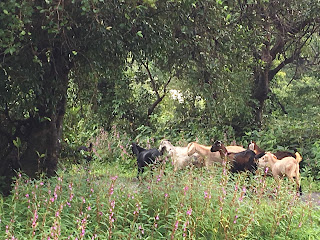Why Sustainable Farming?
Environmental Impact
Pesticides and Fertilizers
Pesticides, Fertilizers, Over watering, hectors of land with crop mono culture, flattening of lands for commercial agricultural purposes. Use of herbicides has caused an irreversible damage to our farms and the environment. One cannot see bees in the farms today due to excessive spraying. That affects the pollination, to the extent that people are hand pollinating and administering more growth hormones to the plants.
The worldwide consumption of pesticides has reached 2.6 million metric tons. Of this 85 percent is used in agriculture. In addition to the increase in quantity of pesticides used, farmers are using stronger concentrations of pesticides, they have increased the frequency of pesticide applications and increasingly mix several pesticides together to combat pesticide resistance by pests.
Example: The bulk of pesticides used in India are insecticides which lead to insecticide-resistance by pests and cause most damage to human health the insecticides used is often of older types belonging to organophosphates and carbamates noted for their acute toxicity. Some of these are already banned or severely restricted, but are cheaper than newly invented
The initial use of pesticides, has been very effective in reducing pest infestations and
increasing agricultural production and productivity. However, over time targeted pests have developed resistance to pesticides necessitating increasing applications or resulting in rising populations of pests or both.
This happens because the pesticides have also eliminated the beneficial predators of pests. The use of the chemical control creates disequilibrium in the system.
Excellent examples are the brown planthopper (Nilaparvata Ingens) and the rice gall midge (Orseolia oryzae) pests.Severe outbreaks of the brown planthopper occurred on rice in the 1970s, 1980s and the 1990s in India causing millions of hectares of rice to be destroyed. Planthoppers are naturally controlled by wolf spiders and a variety of other natural predators and parasites which are destroyed by many of the pesticides commonly used on rice
Apart from pests developing resistance to pesticides there are many harmful effects of pesticides that affect agricultural sustainability, the environment and the health of farmers. Declining soil fertility adversely affects productivity and increases the need to apply larger quantities of chemical inputs to maintain productivity, thus further increasing the costs to farmers.
It is difficult to measure the extent of the damage done to wildlife from the use of
pesticides. However, many species have been affected, especially animals at the top of the food chain, the natural balance of predators and prey has been disrupted, particularly in the insect world. Birds, too, have been a casualty from pesticide poisoning. Farm animals and pets are also affected by the use of pesticides.
In addition to the damage caused to the environment and to agricultural land, pesticides impact directly on other production processes. For instance, fisheries production has been adversely affected. Many pesticides are highly toxic to fish at normal rates of application .
Razing of forests for agricultural and grazing lands
Besides pesticides, another huge threat to environment comes from razing the forest lands for agricultural and grazing grounds purpose. This displaces/eliminates the green cover and the wildlife making way for more crop production. Felling of the trees has resulted in depletion of ground water.
Latest example of large scale devastation being Amazon forest fires for making way to grazing land, which can feed the Animals, which will then be consumed by Human!
Why Natural/Sustainable Farming
Natural/Sustainable Farming (An ecosystem which is closest to the forest) espouses plantation of native trees around the farming land, water harvesting for the farm use, zero tillage for the land (to save delicate biota of soil), mulching and use of animal dung manure (most preferred Desi cow dung manure in India). Creating a food forest for the birds, bees and other wild animals on the land builds the food chain (80:20 ration of the good for crop and bad for crop species) and a balanced eco-system is developed.
-Vaishali Gadagil
Founder- Shashwat Organics




Comments
Post a Comment